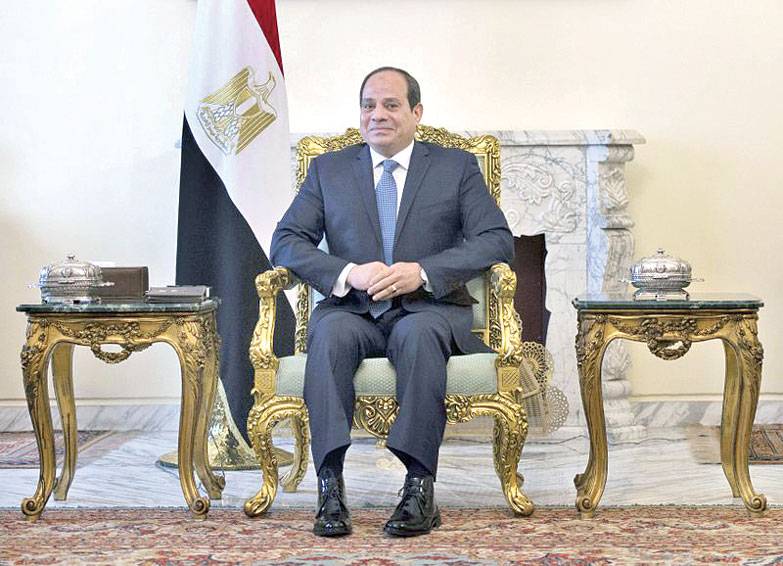CAIRO - Egypt’s parliament advanced a proposal on Tuesday to amend the constitution in a way that could allow President Abdel-Fattah el-Sissi to stay in office well beyond the end of his current term in 2022. El-Sissi led the 2013 military overthrow of an elected but divisive Islamist president and was elected the following year. He has presided over an unprecedented crackdown on dissent, and was re-elected last year after all potentially serious challengers were jailed or pressured to exit the race. A constitutional amendment to extend el-Sissi’s rule would add to concerns that the country is slipping back into authoritarianism eight years after a pro-democracy uprising ended Hosni Mubarak’s nearly three-decade rule.
Parliament speaker Ali Abdel-Al said two thirds of the 596-seat legislature endorsed the proposed amendments. It’s unclear when the assembly which is packed with el-Sissi supporters will take a final vote, and a national referendum would need to be held to amend the constitution. A draft of the proposed amendments, obtained by The Associated Press, shows concerted efforts by the pro-government “Supporting Egypt” coalition to consolidate el-Sissi’s power.
The 64-year-old leader could be allowed to run for a third and fourth six-year term, potentially extending his rule to 2034. The motion was submitted Sunday after approval by a required fifth of the chamber’s 596 lawmakers, the vast majority of whom are el-Sissi supporters. “In order to maintain stability and to complete the development plans, there is a proposal to extend the presidential term to six years,” said Abdel-Hadi el-Qassabi, head of the majority coalition in the parliament, which is sponsoring the move. Abdel-Al said Sunday that the amendments “are rooted in the interest of both the state and the Egyptian people.” “Conditions on the ground, the situation in the region and the nation’s circumstances have proven that (the current term limits) are unsuitable,” he said.
Pro-government media figures have been arguing for months that two terms are not enough for el-Sissi to fulfil his ambitious vision of modernizing the country, including overhauling its economy and defeating Islamic militants. Yasser Rizq, chairman of the state-owned al-Akhbar daily and a close confidant of el-Sissi, has argued in recent columns that constitutional amendments were necessary to prevent Islamist parties from gaining power.
The Muslim Brotherhood group won a series of free and fair elections after the 2011 uprising, culminating in one of its senior figures, Mohammed Morsi, winning the presidency in 2012. Morsi’s rule proved divisive, however, and the military removed him from power amid mass protests a year later. Authorities have since outlawed the Brotherhood as a terrorist group and arrested thousands of its members.
The government has also jailed a number of prominent secular activists. It has banned unauthorized protests, heavily restricted civil society groups and blocked hundreds of websites. El-Sissi has repeatedly said he would not stay in office any longer than Egyptians wanted him to and that he was not in favor of amending the constitution’s term limits. But opposition parties and media have come under intense pressure during his rule, and political figures who have challenged him have been jailed, fled into self-imposed exile or withdrawn from public life.
The proposed amendments also include the introduction of the role of vice president, a revived senate and the enshrining of a quota of 25 percent for women in the House of Deputies. Also included is “adequate” representation for workers, farmers, youth and people with special needs in the legislature.
The motion would give the president the power to appoint top judges and bypass judiciary oversight in vetting draft legislation before it is voted into law. The amendments are nearly certain to be adopted by the legislature, but they would also need to be put to a national referendum. Many opposition lawmakers and figures have decried the motion, and critics have taken to social media to reject what they see as an attempt to enshrine an authoritarian government. “Project to amend Egypt’s constitution unfolding & in full throttle,” Nobel Peace Prize winner and former vice president Mohamed ElBaradei, who left Egypt in 2013, tweeted on Monday. “Main features: extending presidential term limit; diminishing judicial and anointing military as the guardian of the state. Arab Spring in reverse!”






